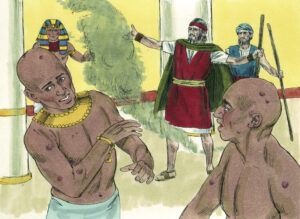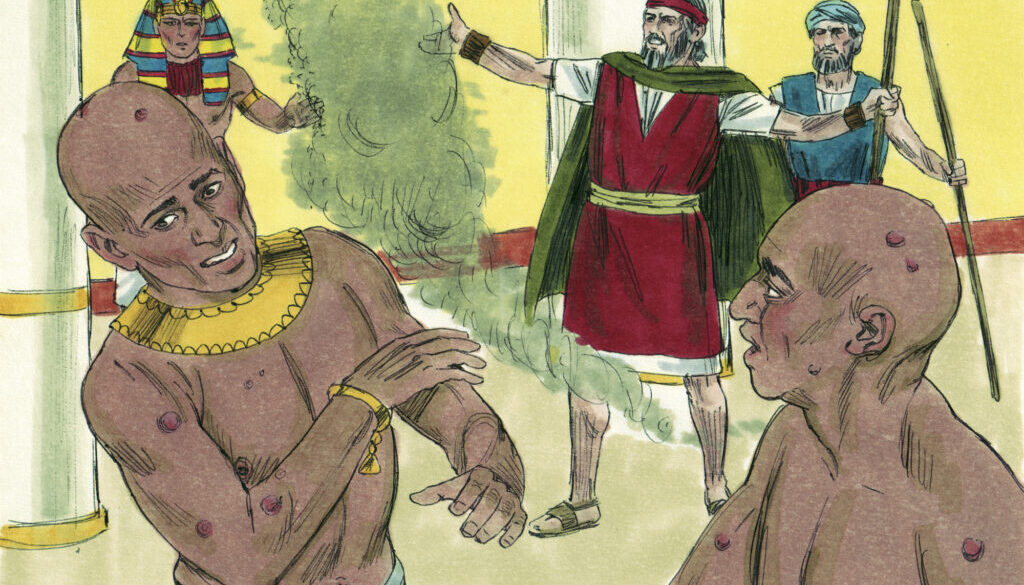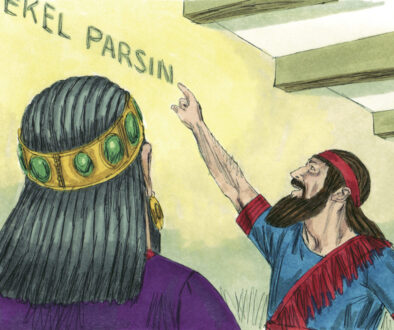Exodus 9 Round Seven

Moses and Aaron are before Pharaoh again; Round seven! This sixth plague will hurt like no other. Physical pain in the form of boils. Head to toe!
When Moses and Aaron come to Pharaoh this time, God didn’t tell them to say a word. This was a demonstration only. But it was done in front of Pharaoh so he would KNOW where his pain came from. The boils would break out immediately! And the magicians were helpless to try and perform signs. They were in too much pain on their own.
♥ ♦ ♥
Moses is sitting under his favorite tree in the evening, spending time with the Lord. He doesn’t hear an audible voice every night but he enjoys their time together just the same. Tonight the Lord speaks to him again.
“Moses.”
“Speak Lord. Your servant is listening.”
“It is time to show Pharaoh a new ‘wonder’ on his way to freeing my people.”
“It has been a few days since the last ‘wonder’ left. I was curious when You were going to send the next one.”
“Tomorrow morning I want you to go to the kiln. I want you to gather up some of the soot from the kiln…
“The one we bake the bricks in?”
“Yes. That one. I want you to put it in a small pouch that you can carry easily on your belt. You and Aaron are to take this soot and, in the sight of Pharaoh, scatter it into the air. ‘It shall become a fine dust over all the land of Egypt and become boils breaking out in sores on man and beast throughout all the land of Egypt’ (verse 9). ”
“I will follow Your directions Lord but may I ask why soot from the kiln?”
“This is the place of suffering for the Hebrews and a place of prosperity for the Egyptians. Now it will be a source of suffering for the Egyptians and a source of rejoicing for the Hebrews instead.”
Moses and Aaron went early in the morning to gather the soot. As soon as Aaron had his pouch filled, the two of them went to stand before Pharaoh. Their arrival at the gate caused the guard great distress. He knows trouble is coming. He doesn’t even wait for Moses to ask for an audience. He jumps up and hurries to Pharaoh’s throne room to announce them.
“Let them in” replies Pharaoh in a voice dripping with boredom and disdain.
Moses and Aaron don’t utter a word once they are standing before Pharaoh.
“I know, I know. ‘Let My people go’” mocks Pharoah.
Still silent, Aaron reaches into his pouch and withdraws a handful of the dust from the kiln. He throws it into the air.
A gust of wind whips through the throne room at that moment and picks up the soot. The soot is dispersed throughout the room. Pharaoh watches Moses without saying a word. Seconds later he begins scratching his left bicep. Then he moves to scratching his neck. In the background all the others Egyptians begin scratching too. Their scratching soon turns to digging at their skin and then into painful sores. It is as if the soot itself has entered their pores and began to fester inside them.
“Magicians” demands Pharaoh. “Strike Moses and Aaron with boils as well!”
The magicians are too busy trying to find relief from their pain to even attend to Pharaoh’s command.
Egypt comes to a standstill again as every man, woman and beast suffer in agony for four days. In Goshen another “work holiday” is observed. The people are focusing on the Lord instead as ALL give thanks for the division between the two people, and the Lord fighting their battle. They are excited about the prospect of Pharaoh relenting and releasing them.
On the fifth day when the Hebrews are ordered back into the quarry and treated even worse than before their hope begins to tarnish. Pharaoh will NOT release them!
“Why is the Lord taking so long?” “Is He torturing Egypt just so they will make our lives even more miserable?!” “Why can’t He just leave us alone?!”
Moses shakes his head in wonder as he hears the hearts of the people. “Why can’t they just trust You Lord?”
“Because they are a stubborn people and they need a little more convincing.”
“When will they be convinced and when will this end?”
“Soon My son. Remain obedient and faithful no matter how it looks or what the people say.”
“Yes Lord. I will follow wherever You lead.”
(to be continued)
I know our reading doesn’t specifically state this is the attitude of the Hebrews but their later behavior leads me to believe this is how they responded. Also that is how the story was impressed upon me. In the face of their miracle all they saw was the adversity. They were only singing when things were going great. They were having trouble maintaining that joy in the middle of the struggle. They were seeing the storm instead of the boat carrying them in safety. They didn’t suffer the sores. They were free from that agony, but yet that wasn’t enough to convince them fully of God’s faithfulness.
Father I am as guilty as Israel of praising in the good times and fretting in the bad ones. I have learned though to RUN to You in the middle of the struggles. Those seem to be the greatest growth times. Was that true for Israel too? Did they grow the most when under pressure? Or were their growth spurts confined to the demonstrations of Your miracles?
In the storm when Your miracles come, they make my heart sing! That is what was happening with the Hebrews. Their hearts must have been singing at the end of each storm. But there were more storms to walk through. More to stress the lessons of the last one. I PRAY I carry the lessons from my previous storms into tomorrow’s storms. THOSE lessons are where I find my joy in the midst of sorrow. Honestly, my sorrows have been minor compared to some that others have faced. But my lessons are no less trustworthy and affirming of Your love than anyone else’s. Thank You for keeping me safe in the storms and for keeping me protected from even worse ones.
I pray for those who are walking through “hurricane force storms” in their lives. Please hold them fast in Your arms and remind them that You are just as present on the mountain tops as You are in the deepest darkest valleys or the roughest seas. Thank You for walking me out of those deep dark valleys too.



